- English and Creative Writing
- Studying
- Spotlight on Alumni
Spotlight on Alumni
Here we feature the stories of just some of the many thousands of students whose lives have been changed by their experiences doing an undergraduate course with the Department of English and Creative Writing. Every student’s pathway through, and after, their degree, is different, and these testimonies illustrate the variety of life opportunities a degree from our department can give you.
Ally Louks
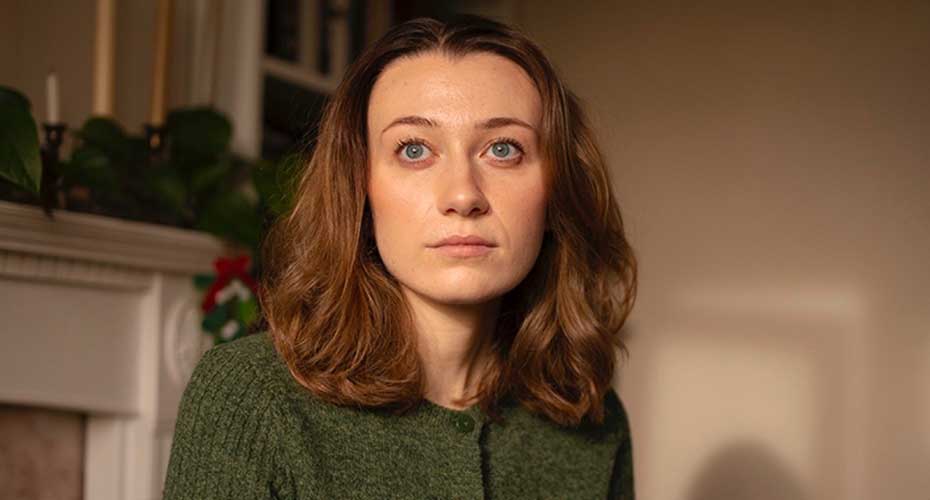
What have you been up to since you graduated and what does your current career look like?
After graduating from Exeter, I went on to study for a Master’s degree in English Literature: Issues in Modern Culture at UCL, and then a PhD in English Literature: Criticism and Culture at the University of Cambridge. Since finishing my PhD, I have been working as a supervisor in English Literature at Cambridge, teaching undergraduates in one-to-one supervisions and larger group seminars. I’m in the process of turning my PhD thesis into an academic monograph and I’m also writing a trade book, while developing an interdisciplinary post-doctoral project.
How would you describe your experiences studying in the Department of English & Creative Writing during your time at Exeter?
I am so glad I decided to study English Literature at Exeter. As someone interested in critical and cultural theory, the course gave me an excellent foundation in both, and I appreciated the huge range of modules and the freedom of choice studying at Exeter allowed me. I can honestly say that I enjoyed every part of the course, from the modules, to the lectures, to the writing assignments. I greatly benefited from the mentorship of multiple senior members of the department, who were unerringly kind and supportive, and I am doing my best to pay their generosity forward through my own pedagogical style.
How do you think your time at Exeter (including both your degree programme and the wider University experience) has helped you to progress in your career?
My time studying at Exeter hugely influenced my development as a scholar, as a writer, and as a person. It introduced me to frameworks that I might not otherwise have encountered, which were foundational to the research I went on to do after my undergraduate degree. I am now teaching many of the theoretical approaches that I first learned about at Exeter, and I remember and employ some of the examples that my lecturers used back when I was an undergraduate. I made professional and social connections with members of the department during my degree that have remained strong ever since.
What advice would you give to someone thinking about studying for a degree in the Department of English & Creative Writing at Exeter?
I would wholeheartedly recommend it. Exeter has one of the largest English departments in the country and a huge wealth and variety of expertise. Whatever time period or aspect of literary studies you might be interested in, I feel confident in saying that studying at Exeter will help you to foster and develop your understanding of it. Members of the department hold office hours every week, which allows students to speak to experts within the field and get the help or advice that they might need while navigating the degree and being away from home for the first time.
Roshana Wickremasinghe
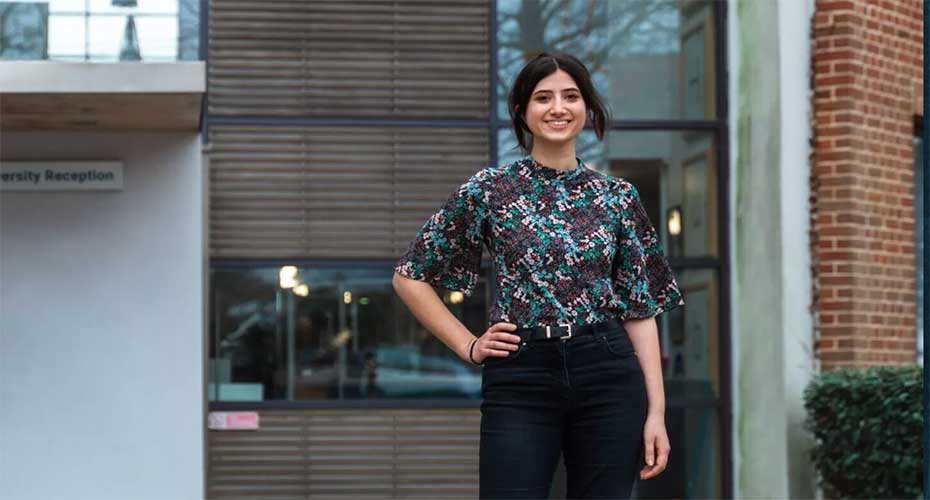
What have you been up to since you graduated and what does your current career look like?
On graduating from Exeter in 2017, I took up a place on the Teach First Leadership Development Programme. Through the scheme, I taught English in a secondary school in Dorset, taking on additional responsibility for the Gifted and Talented programme. I left teaching at the start of 2020 to move into the higher education sector, starting as a policy advisor at a students’ union and eventually moving into widening participation. I am currently the Head of Student Success at the University of Southampton, with responsibility for our inclusion and financial support offer for under-represented student groups. Along the way, I’ve also managed to squeeze in a MA and (a nearly completed) doctorate in Education, a school governor role, co-founding a women’s cycling group and an ill-fated appearance on University Challenge. Working in professional services within higher education was never something I had considered, but it’s been a brilliant career so far grounded in social justice with a tangible impact.
How would you describe your experiences studying in the Department of English & Creative Writing during your time at Exeter?
I was enrolled on the English with Study in North America programme (ESNA), which made for an atypical experience where I was only based in Exeter for my first and final year. However, the programme was a unique opportunity to learn about literature through multiple perspectives. I was lucky enough to study modules as broad as sex in French literature and film, cultures of neuroscience, and medieval English (which was a wild experience in an American classroom!). What I appreciated most was the diverse and creative methods of assessment across Exeter and my exchange host, including the creation of a scrapbook on artists’ work pre and post stroke; the development of an exhibition space on the representation of war in graphic novels, and writing (/badly performing) a play on Plath’s Daddy. Being exposed to less traditional assessment methods greatly supported my understanding of literature and notions of the canon through a critical lens, which has been helpful in my career when considering inclusivity in higher education more broadly.
How do you think your time at Exeter (including both your degree programme and the wider University experience) has helped you to progress in your career?
Whilst I didn’t plan on a career in higher education, my experience at Exeter had a huge impact in how I think about university more broadly, including how degrees can be approached differently whilst maintaining rigour. Through exposure to some of the top academics in the country, an unbelievably diverse and innovative module list, and a stunning campus to boot, I have always been able to hold up Exeter in my mind as a gold standard for how a university can and should deliver an education. I have been very fortunate to progress quickly through my career, gaining a senior management role in my directorate at a young age, and this has absolutely been down to the skills I was able to develop on my degree programme. My experience also repaired a relationship with academic study following a challenging time in sixth form, and this has also allowed me to pursue degrees back to back all the way up to doctorate level which is not something I would have thought possible when I was completing my A levels. Having such a positive experience at university, which I know through my work is increasingly challenging through cost of living, inflexible approaches to study, and persistent differential outcomes for students from under-represented backgrounds, is the best foundation I could have had for a successful and rewarding career.
What advice would you give to someone thinking about studying for a degree in the Department of English & Creative Writing at Exeter?
I initially applied for Exeter as a default choice as someone attending a school where Oxbridge or Russell Group were the ‘only’ options, however I can still remember looking at the module options listed on the website and being blown away by their sheer diversity and creativity. This was not something that I encountered when researching other degree programmes, which tended to lean more towards canonical and colonised approaches to studying literature. I would also recommend looking into the various programmes within the Department, including the dual honours options and ESNA. I really believe that being an ESNA student really set me apart in my early career, and there were so many benefits beyond travel and easy access to Trader Joe’s. Exeter really is a standout university that I believe offers something different to many of the other Russell Group universities, and it’s worth considering the approach of the Department when making an application.
Megan Davies
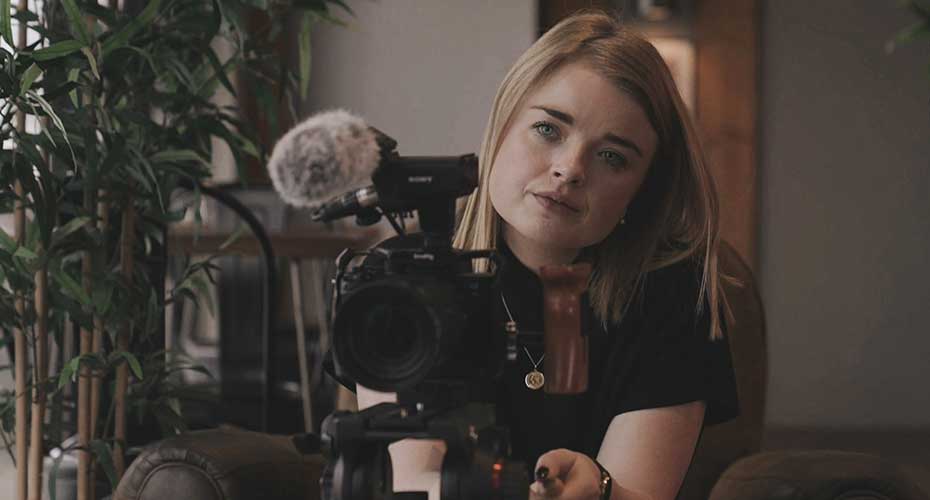
What have you been up to since you graduated and what does your current career look like?
I left Exeter in 2018 which is hard to believe. My main focus since leaving has been my career in journalism. I did an MA in Broadcast Journalism at Cardiff University and the week after finishing the course there, I joined the BBC. It’s been a whirlwind of long shifts, lots of coffee and seminal experiences. Since joining the BBC I’ve worked in radio and television, been an editor on our newsdesk, planned and produced original stories and broadcasted live in both Welsh and English. I am currently with the news commissioning team which means I work to develop ideas, get them into shape and hopefully get them commissioned.
How would you describe your experiences studying in the Department of English & Creative Writing during your time at Exeter?
My time at Exeter was a very happy one and I’m grateful for the support and guidance of my tutors there. I hadn’t originally intended to focus so heavily on the creative writing element of the degree however, I found it to be so stimulating. I felt very supported by my tutors and by the end of the course had a much better understanding of my voice.
How do you think your time at Exeter (including both your degree programme and the wider University experience) has helped you to progress in your career?
Exeter pushed me to push myself. The course was challenging, in a positive way, and meant that I was stimulated throughout it all. I studied English and French, so I was able to capitalise on the Erasmus scheme in 2016/2017. In France I did three journalism placements, including at Vogue Paris, which undoubtedly turbocharged my CV. I doubt I’d be where I am now without those formative experiences.
What advice would you give to someone thinking about studying for a degree in the Department of English & Creative Writing at Exeter?
Do not hesitate. You will absolutely be happy and stimulated. I appreciate that writing to your younger self is slightly cheesy but if I could have a word with myself circa 2014, I’d tell her to be open to opportunities, read often, don’t be afraid of looking stupid and ask questions.
Sofia Gallucci
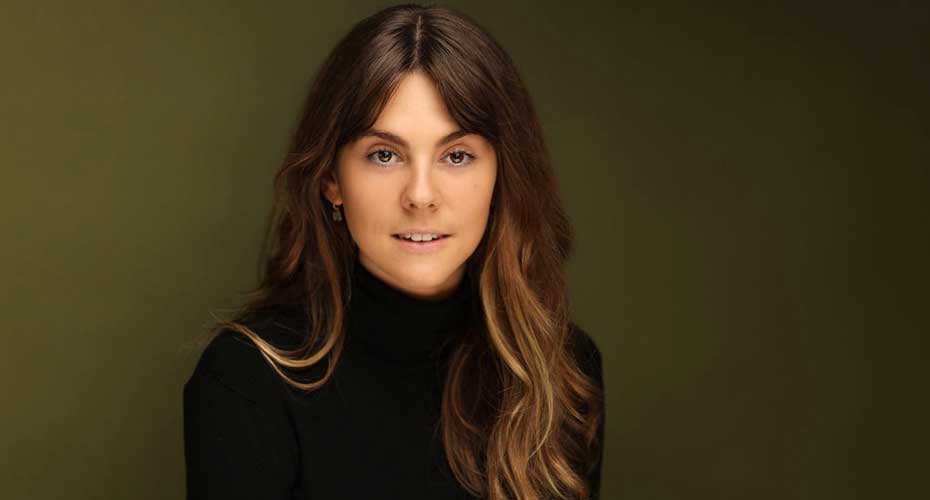
What have you been up to since you graduated and what does your current career look like?
Since graduating in 2021 with a BA in English and Drama, I completed an MA in Theatre Directing at the Bristol Old Vic, spending another year immersed in the vibrant South West arts scene. I was then appointed Resident Director on SIX in the West End, where that year the show won Best West End Show at the What’s On Stage Awards and continued its sold-out run, performing nine shows a week. Since then, I have worked as a professional theatre director and dramaturg across the UK, most recently at the Shakespeare’s Globe this Winter. Alongside directing, I freelance as a dramaturg, providing research and interpretative support for plays in production. In addition to my creative roles, I tutor English privately and am preparing to begin a PhD at the University of Exeter, exploring Transness and Lovesickness in Early Modern Drama.
How would you describe your experiences studying in the Department of English & Creative Writing during your time at Exeter?
I thoroughly enjoyed my time in the Department of English and Creative Writing at the University of Exeter. The course offered an impressive range of topics and time periods, allowing me to fully immerse myself in the areas of literature I was most passionate about, particularly Renaissance and Early Modern Drama. The staff were exceptional - world-class lecturers whose ground-breaking research informed and enriched our learning. Their passion for their fields was truly inspiring. So much so, that two of the lecturers I had in my first year are now my prospective PhD supervisors. Beyond the academics, the supportive and collaborative environment within the department created a space where I could thrive. Studying at Exeter not only deepened my literary knowledge but also inspired me to pursue further research, culminating in my decision to undertake a PhD focused on the Early Modern period.
How do you think your time at Exeter (including both your degree programme and the wider University experience) has helped you to progress in your career?
My time at Exeter laid the foundation for my career and continues to influence it. Many of my university peers are now collaborators in the industry; even my two flat mates are friends I met in the Department of English at Exeter and who work in the creative industries. I spent a lot of my time in the student theatre scene at Exeter (VP of the Drama Society) and it was the best ‘playground’ to prepare me for what the industry was like. Academically, my degree honed key skills such as research, analytical thinking, and writing—all of which are crucial in my work as a director and dramaturg. Moreover, my love for Early Modern Drama flourished during my studies, thanks to the exceptional teaching I received. The guidance of two lecturers, who I met in my first term, has been instrumental in shaping my academic journey. I’m thrilled to have them as prospective PhD supervisors as I take the next step in my career.
What advice would you give to someone thinking about studying for a degree in the Department of English & Creative Writing at Exeter?
I wholeheartedly recommend studying in the Department of English & Creative Writing at Exeter! I pursued a combined honours degree in English and Drama, and the department was incredibly supportive of this pathway. The staff are approachable, encouraging, and well-connected within their fields. They challenge you to reach your full potential while fostering a warm and inclusive environment. Studying English at Exeter opens doors to countless opportunities, and the program’s flexibility allows you to explore your literary interests in depth. If you’re passionate about literature, Exeter is the perfect place to grow academically and creatively. The vibrant community, exceptional teaching, and supportive network will help you achieve your ambitions while making your university experience truly unforgettable.
Emily Millwood
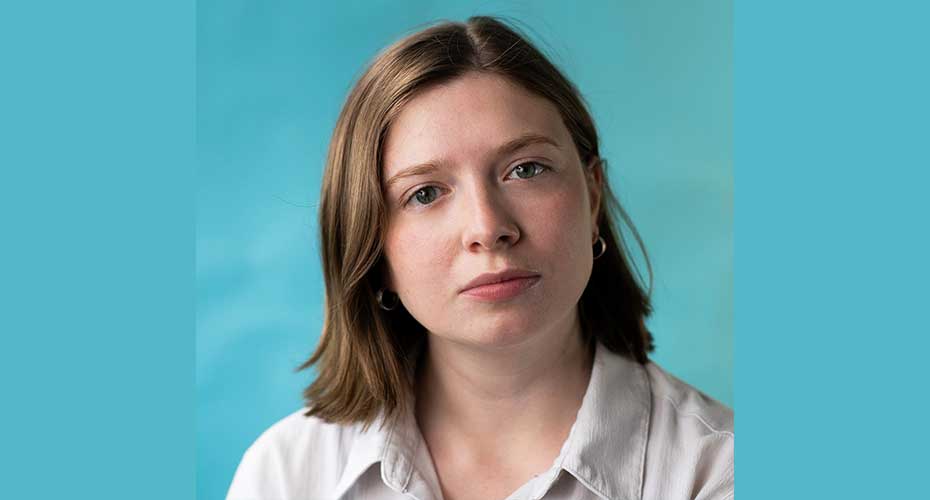
What have you been up to since you graduated and what does your current career look like?
After graduating from Exeter I went straight to drama school and did a Masters in Acting at East 15 Acting School and have since been working as a professional actor across stage and screen. I’ve been lucky enough to appear in beautiful open-air venues across the country performing Shakespeare, at the Edinburgh Fringe and Camden Fringe in award nominated shows and in various short films on the film festival circuit. Last year my first TV role on Disney + and Hulu’s Black Cake came out which was an amazing experience to film. I’ve had everything from being in a bath full of soup to fake pregnancy bumps to sword fighting!
How would you describe your experiences studying in the Department of English & Creative Writing during your time at Exeter?
I loved the English department. From the very beginning of my degree and throughout I felt challenged but supported by all the staff, particularly by those involved in early modern studies who encouraged me to pursue my specific research interests. I was able to curate my modules to my interests because of the wide range of studies within the department. The archival material that the department has physical access to is incredible and it blows my mind to think I held letters written by Daphne du Maurier and original quarterlies of Charles Dickens’ stories. My studies really inspired a love of academia and in another universe I’m still in the Exeter department as Dr Millwood!
How do you think your time at Exeter (including both your degree programme and the wider University experience) has helped you to progress in your career?
Exeter gave me the confidence I needed to go and start pursuing my dreams. I wasn’t sure if I wanted to pursue acting professionally or not until one seminar I had hogged the class reading of Paradise Lost for a very long time for a particularly juicy monologue and I thought “I have to give this a go for real”. The academic grounding Exeter gave me has been a great foundation for tackling a text at the beginning of a job, particularly for the Shakespeare plays I’ve been cast in. Performing in shows as part of Exeter’s T3 festival and taking part in theatre societies gave me a network of creatives that I’m still in touch with and collaborate with, and I still use warmups and techniques from some of those shows.
What advice would you give to someone thinking about studying for a degree in the Department of English & Creative Writing at Exeter?
Look online at what the English department’s curriculum has to offer and if it matches up with some of your interests as it did with mine then it well may be the place for you. This is what set Exeter’s English department apart from other universities I was looking at. It’s not just straight English Literature - with opportunities to delve into creative writing and film studies regularly on offer, and joint honours with another department (which is what I did), it can give you a unique track that fits what you love to study. But from my experience I would say go for it!
Harry McCarthy
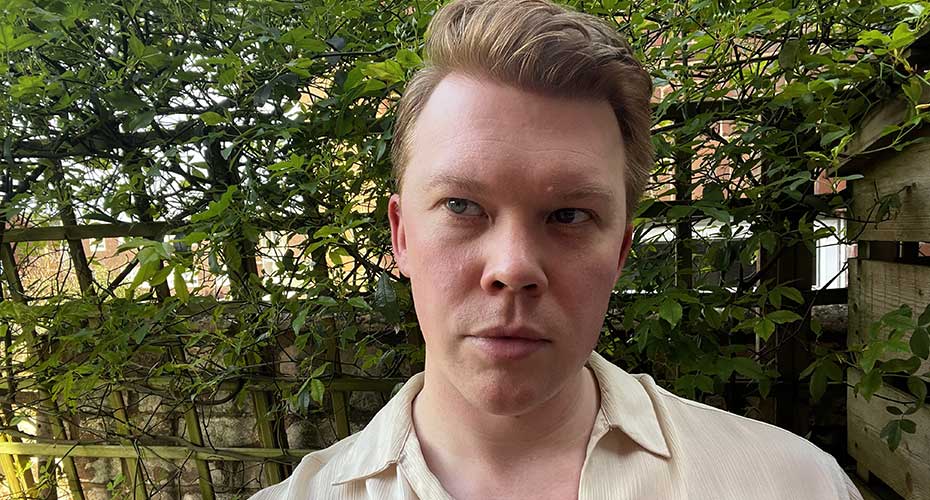
What have you been up to since you graduated and what does your current career look like?
I graduated from Exeter with a BA in English and French in 2015; from there, I went straight on to completing a Master of Studies (MSt) in English Literature (1550-1700) at the University of Oxford, before bouncing back to Exeter to complete an AHRC-funded PhD on early modern drama from 2016 to 2019. Just as my PhD was wrapping up, I won a three-year Research Fellowship at Jesus College (University of Cambridge), where I completed two books. Just as that was finishing, a temporary lectureship came up in the Department of English and Creative Writing here at Exeter, and I made a very happy return to teach on early modern modules from 2023 to 2025. During my time teaching in the Department, I decided to give the US Higher Education sector a go, and in August 2025 I’ll be moving to Los Angeles to take up an Assistant Professorship in Early Modern Literature at the University of Southern California. So one could say that, since arriving at Exeter in 2011, I’ve never stopped learning – and I hope I never will.
How would you describe your experiences studying in the Department of English & Creative Writing during your time at Exeter?
As a Combined Honours student, my time was divided between the Department of English and Creative Writing and the Department of Modern Foreign Languages. While I wouldn’t swap the French half of my degree for anything (though my spoken French is now woefully rusty), I did always look on with envy at my fellow students on the Single Honours programme, as they always seemed to be taking such interesting modules! Given where I’ve ended up, it probably isn’t surprising for me to say that my English studies were transformative – coming from an underfunded state school, albeit one with amazingly innovative and supportive teachers, it was like a brave new world studying the literature and culture of the early modern period (in which I specialised very early on) with the guidance of such impressive scholars, and in the company of like-minded students.
How do you think your time at Exeter (including both your degree programme and the wider University experience) has helped you to progress in your career?
More ways than I could count. If there is an ‘Exeter model,’ then I’m clearly a product of it given that I keep ending up back here (and perhaps I’ll return again…!) I knew I wanted to go down the academic route fairly early into my undergraduate degree, having abandoned early plans to train as a journalist, and the formal and informal mentorship from members of the Department here – some of whom I still turn to for guidance, and probably always will – was and is invaluable. It’s not been uncommon for me to be shortlisted for an academic job and find a number of other Exeter graduates on the interview shortlist – perhaps not the best way to bump into old friends, but certainly a testament to how well a degree from Exeter prepares you for an academic career.
What advice would you give to someone thinking about studying for a degree in the Department of English & Creative Writing at Exeter?
Don’t hesitate. We’re living in a time which needs the values and skills offered by a humanities degree more than ever, and the Department is wholly committed to nurturing them. Don’t arrive thinking you’re expected to know everything – we’re all here to learn from one another, so come with questions (in abundance). A degree in English and Creative Writing and its associated subjects is about so much more than reading great works of literature (itself an unparalleled pleasure, of course); it empowers students to understand how the world has come to work as it does, to scrutinise received narratives, to develop independent responses and solutions to complex social problems, to articulate what matters most to them, and to speak truth to power. As you’re choosing your degree programme, ask yourself: what could be more important than that?
Lara Lawman and Lily Roberts
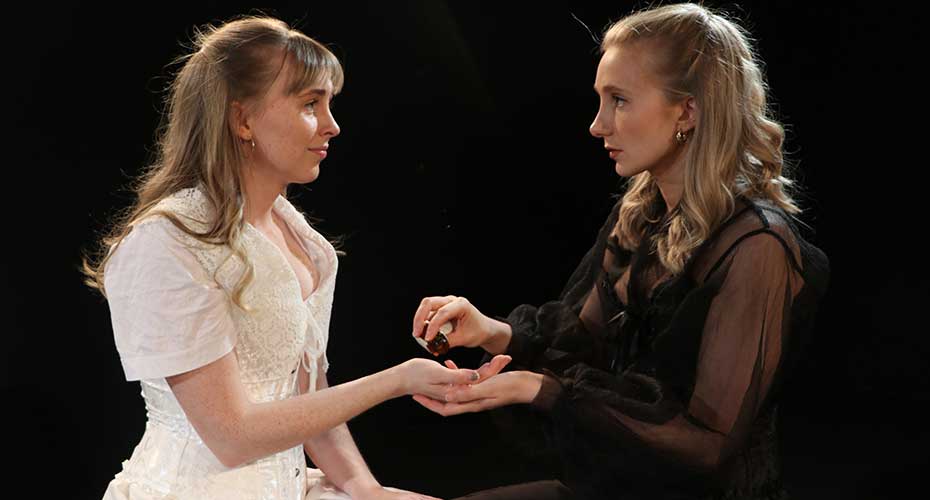
What have you been up to since you graduated and what does your current career look like?
Lara Lawman (BA Liberal Arts) and Lily Roberts (BA English and Drama) co-founded their theatre company, Tale Blazers. Together, they created the multi-award nominated ‘Rosaline and Juliet’, which has been showcased at the Edinburgh and Camden Fringe Festivals and programmed by Exeter Northcott and Theatre Royal Bath. Lara later achieved a PGCE (Distinction) in Secondary Drama and MA in Drama Directing at the Bristol Old Vic Theatre School. She has shaped her directing practice on a range of projects, such as assistant directing ‘The Winter’s Tale’ at the Tobacco Factory and directing ‘The Effect’ by Lucy Prebble at the Bristol Old Vic. Lily went on to study MA Acting at Mountview Academy of Theatre Arts, graduating with Distinction. Lily currently works in her family’s wedding business, while also working as a stage manager, actor, and assistant director for theatre and film.
How would you describe your experiences studying in the Department of English & Creative Writing during your time at Exeter?
The Department of English and Creative Writing has greatly influenced their practice. Lara and Lily met while studying the ‘Rethinking Shakespeare’ module, and they chose Shakespeare specialisations each year, such as ‘Theatrical Cultures’ with Pascale Aebischer and ‘Spectacular Bodies’ with Harry McCarthy. This provided them with a deep understanding of Shakespeare and Early Modern Performance Studies, boosting their confidence and credibility in creating ‘Rosaline and Juliet’, a behind-the-scenes comedy reimagining of ‘Romeo and Juliet’. Under the guidance of Sam North, Lara studied ‘Writing the Short Film,’ and developed a sitcom episode for her creative dissertation, allowing her to gain skills in writing for a range of mediums. Lily wrote her dissertation on the use of animals in Shakespeare’s history plays, giving her keen insight into how Shakespeare can be viewed through unusual lenses as a means to better understand the texts.
How do you think your time at Exeter (including both your degree programme and the wider University experience) has helped you to progress in your career?
Lara’s BA in Liberal Arts, majoring in English Literature, allowed her to specialise in Shakespeare, performance, and comedy. Her academic understanding of these areas has supported her as a professional director, writer and dramaturg. Lily’s BA in English and Drama gave her the confidence to audition for MA Acting programmes, which in turn has provided her with the opportunities to work in theatre and film that she now has. Their involvement in theatre societies offered them practical experience in roles such as Artistic Director for both Exeter University Spotlights and Shotgun Theatre (Lara) and Treasurer for both Exeter University Shakespeare Company and Shotgun Theatre (Lily). The exceptional quality of student theatre at the University of Exeter serves as an excellent training ground for emerging creative practitioners. For instance, 12 of the 18 cast members in their production of ‘Much Ado About Nothing’ (ShakeCo) went on to train at drama schools after graduation.
What advice would you give to someone thinking about studying for a degree in the Department of English & Creative Writing at Exeter?
Take advantage of the opportunities available to you! Lara and Lily are grateful for their full involvement in the theatre and film community, as the skills, experiences, and relationships they gained are essential to who they are today. The English and Creative Writing tutors are excellent, so make the most of their knowledge and expertise. If you have a project idea, pursue it without worrying about its success—this is your chance to experiment. The resources, such as free rehearsal spaces and fellow creatives, are invaluable. Many successful projects and relationships have started at the University of Exeter when like-minded friends decided to take a chance. Additionally, employers value a degree from the University of Exeter, but they are also interested in the experiences you gain alongside it.
Leonie Thomas
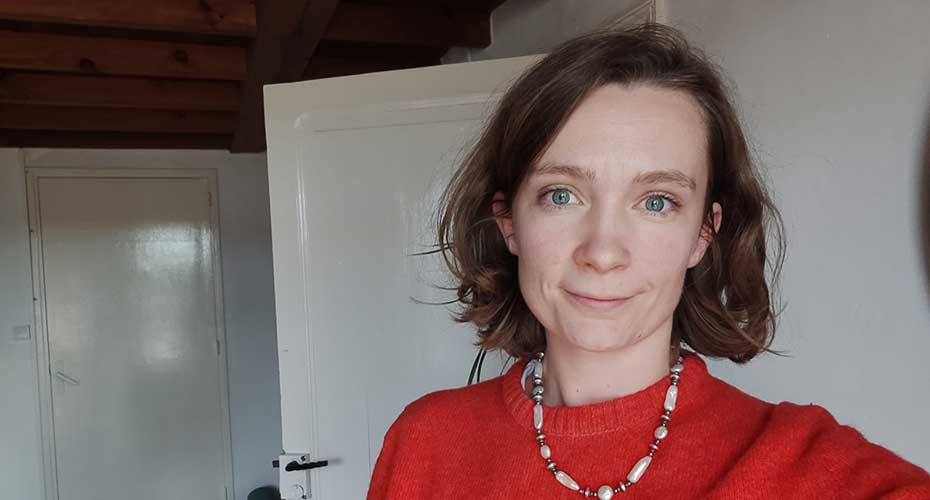
What have you been up to since you graduated and what does your current career look like?
Since I graduated, I did a Masters and a PhD and now I’m a freelance audio producer, living on a farm in the South West of France.
I’ve made programmes for BBC Radio 4, 3, and the World Service, as well as podcast series for cultural institutions such as the Art Fund and the Natural History Museum. I’m currently working as a Development Executive for Overcoat Media, an indie production company based in Wales.
We just made a podcast called Facing the Music for BBC Radio 3. Directing David Suchet in the studio as he read a script I’d written was a real pinch me moment.
We moved to the farm at the start of covid, planted an orchard, and are about to launch our first batch of artisan ciders. I never expected farming or cider to be part of my life, but I’m sure drinking cider at the Quay and Double Locks is a core memory of how good the drink can be.
How would you describe your experiences studying in the Department of English & Creative Writing during your time at Exeter?
I always felt that the quality and range of teaching at Exeter was very high. My ideas were taken seriously, and I was challenged to think deeply and unexpectedly about texts of all kinds. I was introduced to so many different novels and plays and films and given tools to approach whatever was thrown my way. I really loved literary theory (!) and I still use the critical thinking skills I gained during that time every day.
When it came to writing my third-year dissertation, I was given so much encouragement by staff and even a small amount of funding to go to an archive by the library, that the experience transformed my approach to writing and argumentation. I could find sources of my own and say something new! It’s probably still one of the best things I’ve written…
How do you think your time at Exeter (including both your degree programme and the wider University experience) has helped you to progress in your career?
Being able to read something and be able to understand it deeply and quickly, being able to listen and to ask questions, and then being able to take all that material and synthesise it into something else that other people can understand and enjoy is the absolute core of what I do. Now its radio programmes, or emails, or pitches, rather than essays that I write! But the skills are the same.
I should also say without my experience at Xpression FM, the campus radio station, I would not have found my niche or seen my love of radio flourish as quickly as it did. Radio people are great and normally tucked under the stairs or in the basement. Finding my people as an undergrad has helped me know where to look in my professional life.
What advice would you give to someone thinking about studying for a degree in the Department of English & Creative Writing at Exeter?
It sounds cheesy but think about what interests you - be alive to the thing that tickles your brain or makes you go ‘…huh?’. Because if you see something like that on a course list or in a seminar or generally in life, following that curiosity is almost always the right thing to do.
Hollie Piff
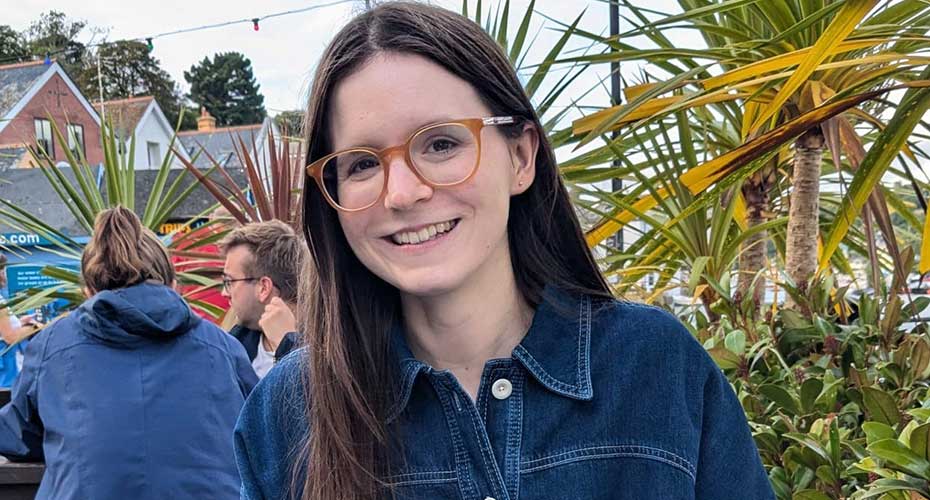
What have you been up to since you graduated and what does your current career look like?
I graduated from Exeter in 2021, in the midst of the Covid pandemic, so the start of my career was far from smooth sailing! After moving home to Berkshire I started working as a Graduate Trainee Library Assistant at the University of Reading’s Special Collections. I had a fantastic year there learning more about libraries, archives, and museums, so in September 2022 I moved to Aberystwyth to complete an MA in Archives and Records Management. While writing my master’s dissertation I returned to the University of Exeter, and I was a cataloguing archivist in the Special Collections here for almost two years. I catalogued three archive collections, managed volunteer projects, led lectures and seminars, designed exhibitions, and hosted outreach events. In the summer of 2025 I started a new role at the University of Surrey as a Cataloguing Archivist (E.H. Shepard Collections).
How would you describe your experiences studying in the Department of English & Creative Writing during your time at Exeter?
I started my degree in English expecting to read, discuss, and write about books. Unsurprisingly, I did quite a lot of that, but I also learnt about film, critical theory, politics, and history. I wrote essays about fashion, created a magazine about American independent film, discussed the political underpinnings of Batman, and wrote my dissertation on modernist food autobiographies. The Department of English & Creative Writing was, and still is, full of incredibly talented, passionate, and generous people that imbued my time at Exeter with a sense of creative exploration. And, while my degree was largely impacted by Covid restrictions, the department worked flexibly to maintain a high quality of teaching in unpredictable times.
How do you think your time at Exeter (including both your degree programme and the wider University experience) has helped you to progress in your career?
Whether I’m cataloguing archives, writing blogs and exhibition captions, or assisting researchers in the reading room, I am regularly using the research and writing skills that I developed during my undergraduate degree. Learning to successfully search for, identify, analyse and cite both primary and secondary sources was one of the most valuable takeaways from my time at Exeter. Unsurprisingly, reading a book or two per week requires effective time management, which is also an important skill when juggling multiple projects at work. I also worked part-time at The Ram Bar, which taught me to manage a team and work well under pressure. And, most importantly, I can skim-read like a champ!
What advice would you give to someone thinking about studying for a degree in the Department of English & Creative Writing at Exeter?
It’s important to enjoy your course and take full advantage of the amazing resources in the department and at the University more widely. If you’re planning on studying English and Creative Writing it’s likely that you love books, so enjoy the hours you get to read and discuss books each week—you won’t have as much time to enjoy them once you graduate! You may arrive at Exeter with a clear idea of what kind of literature you want to study, I arrived at university thinking Jane Austen was decidedly not for me, but don’t limit yourself to familiar texts and topics. I learnt so much about myself and the world around me by pushing myself out of my comfort zone, and I even grew to love Jane Austen.